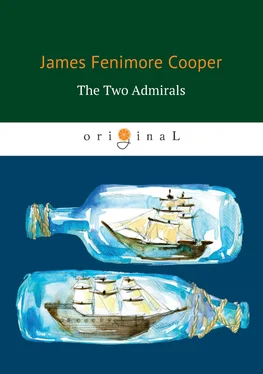Джеймс Фенимор Купер - The Two Admirals
Здесь есть возможность читать онлайн «Джеймс Фенимор Купер - The Two Admirals» — ознакомительный отрывок электронной книги совершенно бесплатно, а после прочтения отрывка купить полную версию. В некоторых случаях можно слушать аудио, скачать через торрент в формате fb2 и присутствует краткое содержание. Город: Москва, Год выпуска: 2018, ISBN: 2018, Жанр: Исторические приключения, Прочие приключения, literature_19, Морские приключения, на английском языке. Описание произведения, (предисловие) а так же отзывы посетителей доступны на портале библиотеки ЛибКат.
- Название:The Two Admirals
- Автор:
- Жанр:
- Год:2018
- Город:Москва
- ISBN:978-5-521-06651-3
- Рейтинг книги:3 / 5. Голосов: 1
-
Избранное:Добавить в избранное
- Отзывы:
-
Ваша оценка:
- 60
- 1
- 2
- 3
- 4
- 5
The Two Admirals: краткое содержание, описание и аннотация
Предлагаем к чтению аннотацию, описание, краткое содержание или предисловие (зависит от того, что написал сам автор книги «The Two Admirals»). Если вы не нашли необходимую информацию о книге — напишите в комментариях, мы постараемся отыскать её.
The Deerslayer
The Two Admirals — читать онлайн ознакомительный отрывок
Ниже представлен текст книги, разбитый по страницам. Система сохранения места последней прочитанной страницы, позволяет с удобством читать онлайн бесплатно книгу «The Two Admirals», без необходимости каждый раз заново искать на чём Вы остановились. Поставьте закладку, и сможете в любой момент перейти на страницу, на которой закончили чтение.
Интервал:
Закладка:
“And where did this letter come from, and how did it happen to fall into your hands?” demanded Bluewater, looking at the superscription, the writing of which he appeared to recognise.
“It hails from Lun’nun, I hear; and they tell me it’s to be a great secret that you’ve got it, at all. The history of the matter is just this. An officer got in to-night, with orders for us, carrying sail as hard as his shay would bear. It seems he fell in with Master Atwood, as he made his land-fall, and being acquainted with that gentleman, he just whipped out his orders, and sent ‘em off to the right man. Then he laid his course for the landing, wishing to get aboard of the Dublin, to which he is ordered; but falling in with our barge, as I landed, he wanted to know the where-away of Admiral Blue, here; believing him to be afloat. Some ‘un telling him as I was a friend and servant of both admirals, as it might be, he turned himself over to me for advice. So I promised to deliver the letter, as I had a thousand afore, and knowed the way of doing such things; and he gives me the letter, under special orders, like; that is to say, it was to be handed to the rear-admiral as it might be under the lee of the mizzen-stay-sail, or in a private fashion. Well, gentlemen, you both knows I understand that, too, and so I undertook the job.”
“And I have got to be so insignificant a person that I pass for no one, in your discriminating mind, Master Galleygo!” exclaimed the vice-admiral, sharply. “I have suspected as much, these five-and-twenty years.”
“Lord bless you, Sir Jarvy, how flag-officers will make mistakes sometimes! They’re mortal, I says to the people of the galley, and have their appetites false, just like the young gentlemen, when they get athwart-hawse of a body, I says. Now, I count Admiral Blue and yourself pretty much as one man, seeing that you keep few, or no secrets from each other. I know’d ye both as young gentlemen, and then you loved one another like twins; and then I know’d ye as luffs, when ye’d walk the deck the whole watch, spinning yarns; and then I know’d ye as Pillardees and Arrestee, though one pillow might have answered for both; and as for Arrest, I never know’d either of ye to got into that scrape. As for telling a secret to one, I’ve always looked upon it as pretty much telling it to t’other.”
The two admirals exchanged glances, and the look of kindness that each met in the eyes of his friend removed every shadow that had been cast athwart their feelings, by the previous discourse.
“That will do, Galleygo,” returned Sir Gervaise, mildly. “You’re a good fellow in the main, though a villanously rough one – “
“A little of old Boreus, Sir Jarvy,” interrupted the steward, with a grim smile: “but it blows harder at sea than it does ashore. These chaps on land, ar’n’t battened down, and caulked for such weather, as we sons of Neptun’ is obligated to face.”
“Quite true, and so good-night. Admiral Bluewater and myself wish to confer together, for half an hour; all that it is proper for you to know, shall be communicated another time.”
“Good-night, and God bless your honour. Good-night, Admiral Blue: we three is the men as can keep any secret as ever floated, let it draw as much water as it pleases.”
Sir Gervaise Oakes stopped in his walk, and gazed at his friend with manifest interest, as he perceived that Admiral Bluewater was running over his letter for the third time. Being now without a witness, he did not hesitate to express his apprehensions.
“’Tis as I feared, Dick!” he cried. “That letter is from some prominent partisan of Edward Stuart?”
The rear-admiral turned his eyes on the face of his friend, with an expression that was difficult to read; and then he ran over the contents of the epistle, for the fourth time.
“A set of precious rascals they are, Gervaise!” at length the rear-admiral exclaimed. “If the whole court was culled, I question if enough honesty could be found to leaven one puritan scoundrel. Tell me if you know this hand, Oakes? I question if you ever saw it before.”
The superscription of the letter was held out to Sir Gervaise, who, after a close examination, declared himself unacquainted with the writing.
“I thought as much,” resumed Bluewater, carefully tearing the signature from the bottom of the page, and burning it in a candle; “let this disgraceful part of the secret die, at least. The fellow who wrote this, has put ‘confidential’ at the top of his miserable scrawl: and a most confident scoundrel he is, for his pains. However, no man has a right to thrust himself, in this rude manner, between me and my oldest friend; and least of all will I consent to keep this piece of treachery from your knowledge. I do more than the rascal merits in concealing his name; nevertheless, I shall not deny myself the pleasure of sending him such an answer as he deserves. Read that, Oakes, and then say if keelhauling would be too good for the writer.”
Sir Gervaise took the letter in silence, though not without great surprise, and began to peruse it. As he proceeded, the colour mounted to his temples, and once he dropped his hand, to cast a look of wonder and indignation towards his companion. That the reader may see how much occasion there was for both these feelings, we shall give the communication entire. It was couched in the following words:
“Dear. Admiral Bluewater:
“Our ancient friendship, and I am proud to add, affinity of blood, unite in inducing me to write a line, at this interesting moment. Of the result of this rash experiment of the Pretender’s son, no prudent man can entertain a doubt. Still, the boy may give us some trouble, before he is disposed of altogether. We look to all our friends, therefore, for their most efficient exertions, and most prudent co-operation. On you , every reliance is placed; and I wish I could say as much for every flag-officer afloat . Some distrust – unmerited, I sincerely hope – exists in a very high quarter, touching the loyalty of a certain commander-in-chief, who is so completely under your observation, that it is felt enough is done in hinting the fact to one of your political tendencies. The king said, this morning, ‘Vell, dere isht Bluevater; of him we are shure asht of ter sun.’ You stand excellently well there , to my great delight; and I need only say, be watchful and prompt.
“Yours, with the most sincere faith and attachment, my dear Bluewater, &c., &c.
“Rear-Admiral Bluewater.
“P. S. – I have just heard that they have sent you the red riband. The king himself, was in this.”
When Sir Gervaise had perused this precious epistle to himself, he read it slowly, and in a steady, clear voice, aloud. When he had ended, he dropped the paper, and stood gazing at his friend.
“One would think the fellow some exquisite satirist,” said Bluewater, laughing. “ I am to be vigilant, and see that you do not mutiny, and run away with the fleet to the Highlands, one of these foggy mornings! Carry it up into Scotland, as Galleygo has it! Now, what is your opinion of that letter?”
“That all courtiers are knaves, and all princes ungrateful. I should think my loyalty to the good cause , if not to the man , the last in England to be suspected.”
“Nor is it suspected, in the smallest degree. My life on it, neither the reigning monarch, nor his confidential servants, are such arrant dunces, as to be guilty of so much weakness. No, this masterly move is intended to secure me , by creating a confidence that they think no generous-minded man would betray. It is a hook, delicately baited to catch a gudgeon, and not an order to watch a whale.”
Читать дальшеИнтервал:
Закладка:
Похожие книги на «The Two Admirals»
Представляем Вашему вниманию похожие книги на «The Two Admirals» списком для выбора. Мы отобрали схожую по названию и смыслу литературу в надежде предоставить читателям больше вариантов отыскать новые, интересные, ещё непрочитанные произведения.
Обсуждение, отзывы о книге «The Two Admirals» и просто собственные мнения читателей. Оставьте ваши комментарии, напишите, что Вы думаете о произведении, его смысле или главных героях. Укажите что конкретно понравилось, а что нет, и почему Вы так считаете.












